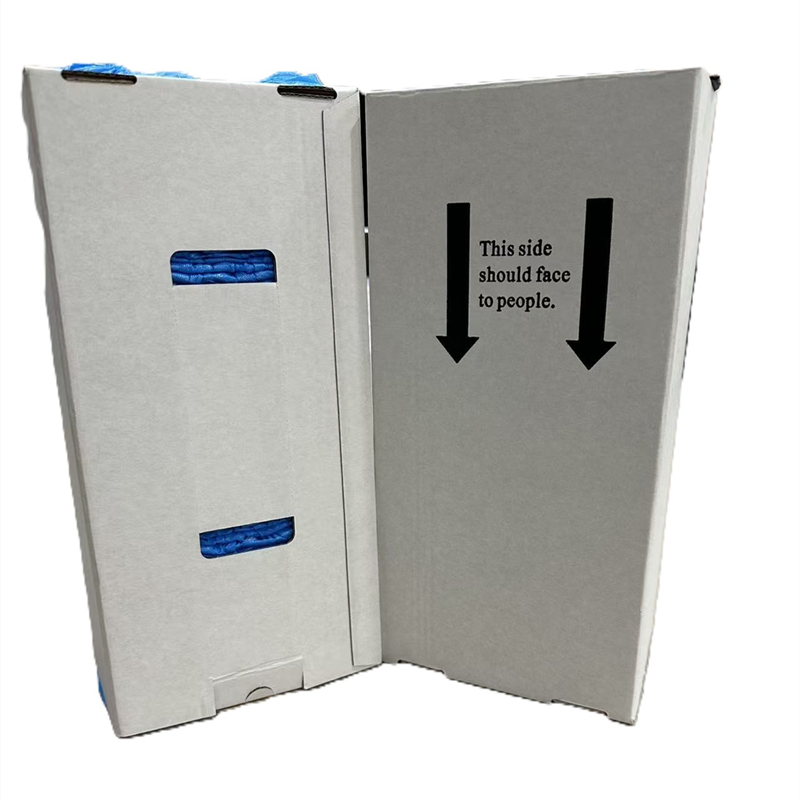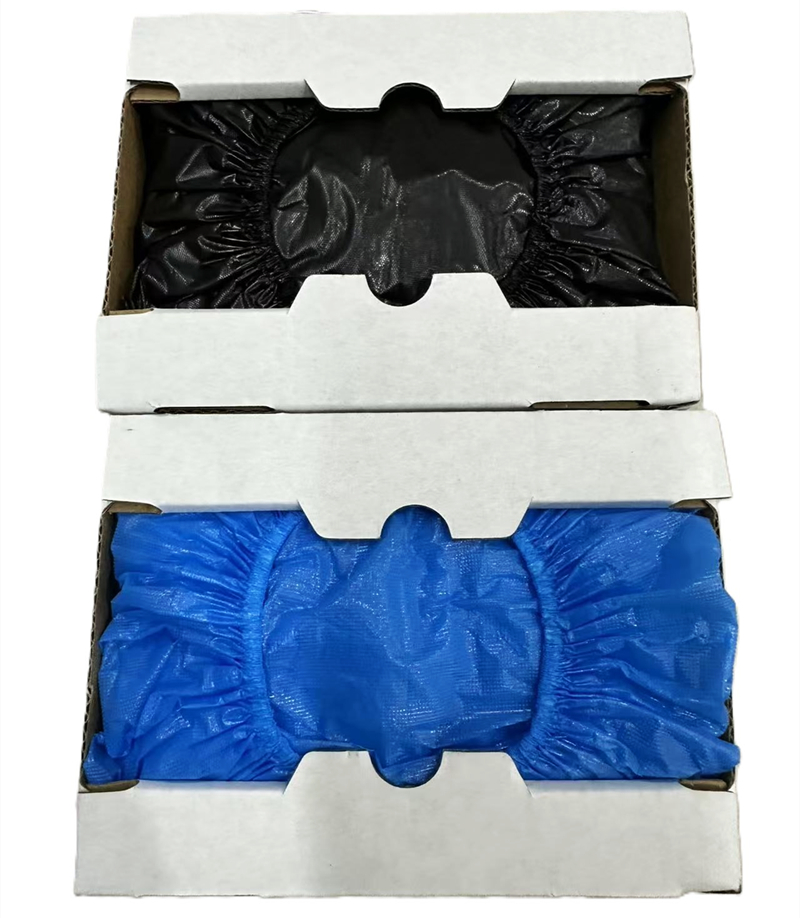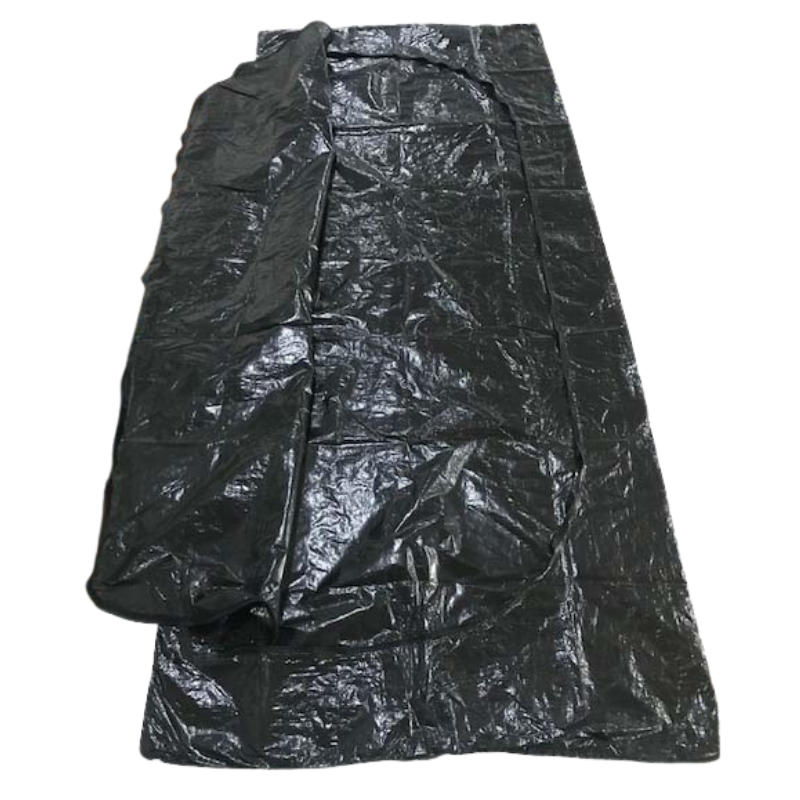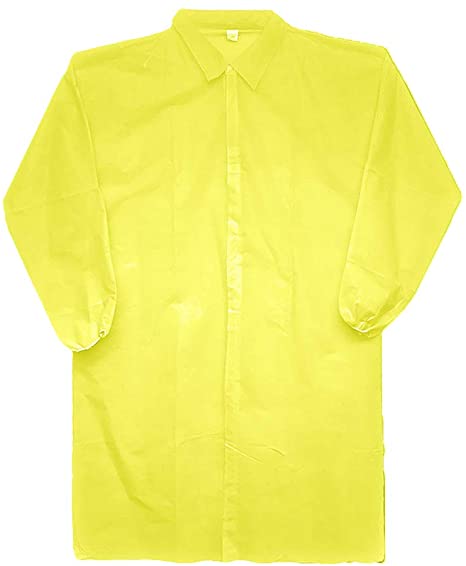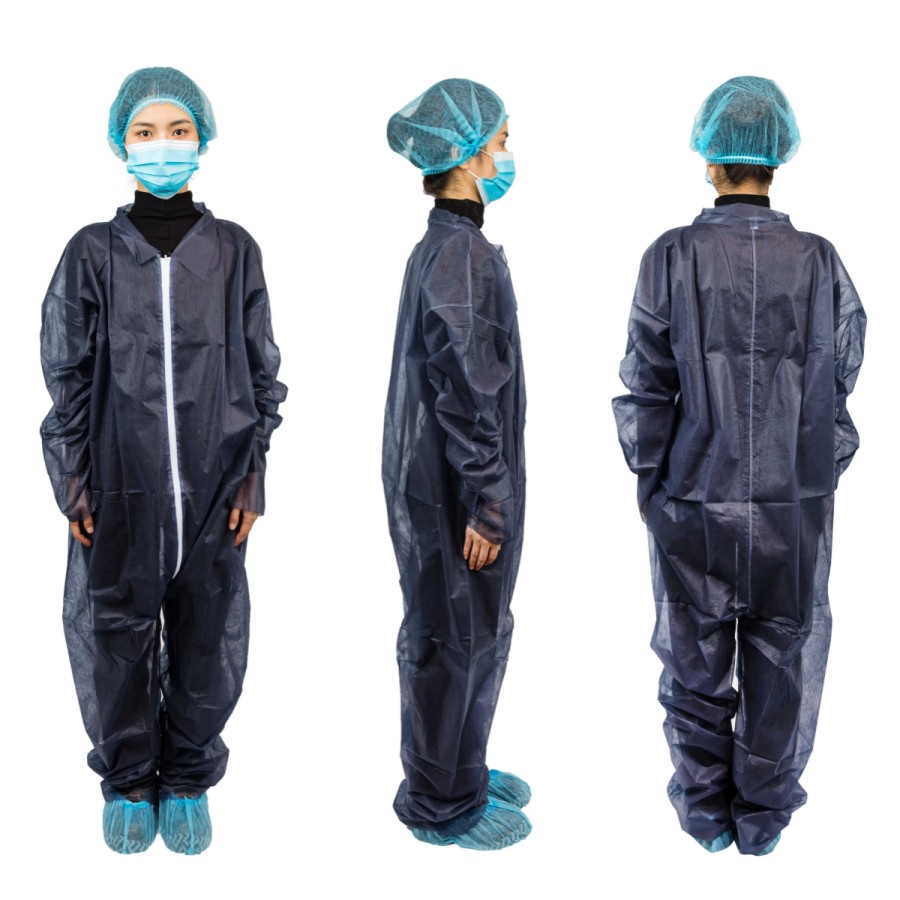Why Food Safety is Super Important
Keeping food safe is a big deal. Bad germs in food can make people very sick. This is called foodborne illness prevention. Think about busy places like restaurants or cafes. They need food safety compliance to keep customers healthy. Even in our homes, safe hygienic kitchen practices matter a lot. Disposable kitchen cloth rolls, like disposable kitchen towels, are a simple tool that helps a lot. They help stop germs from spreading. This makes eating safer for everyone, both in commercial food service and in daily life. We need good sanitation standards everywhere food is made. This helps with pathogen control, meaning stopping bad germs.
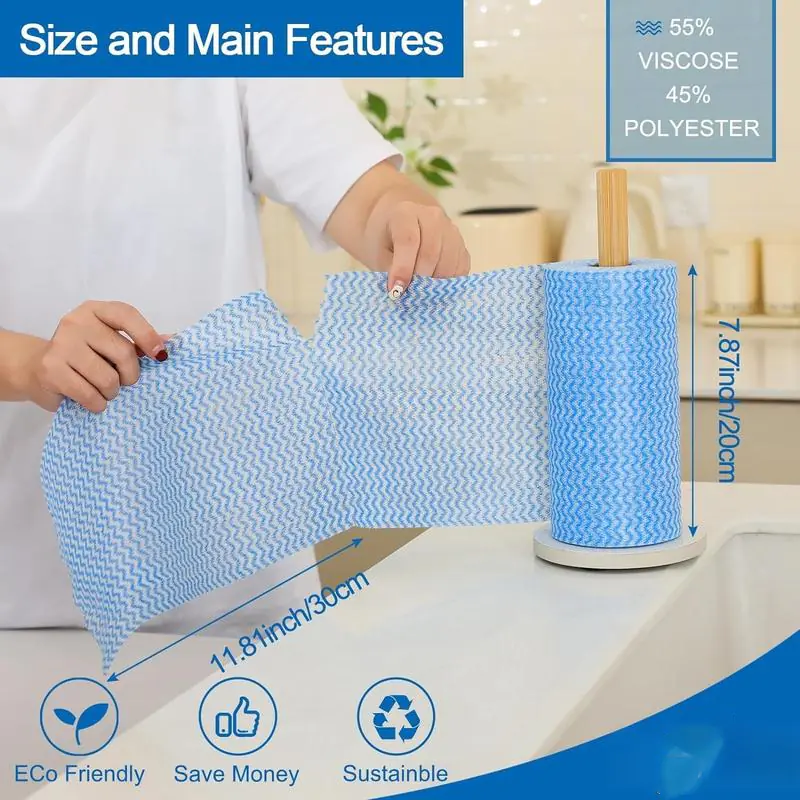
The Sneaky Dangers of Old Kitchen Cloths
Regular kitchen cloths, the kind you wash and use again, can seem okay. But they have hidden problems.
- Germ Homes: Wet cloths are like cozy homes for germs. Bacteria reduction is hard when cloths stay damp. They become bacterial breeding grounds. Germs like E. coli and bad bugs needing Salmonella prevention can grow fast. Even Staphylococcus aureus can live there. Studies show that many used kitchen cloths have unsafe germ levels. One study found this in 56% of cloths in food places! Another found bad germs in over half of restaurant cloths. These cloths don’t help with pathogen control.
- Spreading Messes: Imagine wiping up spilled raw chicken juice. Then, you use the same cloth on the counter. This is cross-contamination. It spreads germs easily. Cross-contamination prevention is key. Old cloths also spread sticky stuff or food bits, like cross-contact allergens, which is bad for people with allergies. This makes allergen management very hard.
- Washing Takes Time: Washing cloths takes time and effort. For a busy catering business, this means staff spend less time cooking. This adds to laundry costs. Sometimes, washing doesn’t even kill all the germs, especially if not done right. The reusable vs. disposable debate often forgets this hidden work.
How Throw-Away Cloth Rolls Make Things Safer
Disposable kitchen cloth rolls are different. They offer single-use cleaning cloths. You use one, then toss it. This is great for safety.
- Stop Germs Spreading: The best part is cross-contamination prevention. Use a cloth for one job, like wiping raw meat surfaces, then throw it away. No chance to spread those germs! This helps with pathogen control and virus suppression. It stops bacterial biofilm prevention efforts from failing.
- Smart Materials: These aren’t just paper. Many are made with material innovation. They use non-woven polypropylene or biodegradable cellulose fibers. These materials are strong and good at soaking things up (high liquid absorption rate). Many are lint-free wipes, so they don’t leave bits behind. Some even have special stuff added, like antimicrobial textiles, to fight germs. They have good wet-strength integrity.
- Follow the Rules: Using disposable kitchen towels helps businesses follow important rules like HACCP guidelines. This is part of good catering hygiene protocols. It helps meet sanitation standards set by groups like the U.S. Food and Drug Administration (FDA) and the European Food Safety Authority (EFSA). Getting good marks in compliance audits is easier. They might even help get NSF certification from NSF International or meet BRC Global Standards and ISO 22000 certification. The Global Food Safety Initiative (GFSI) supports these high standards.
- Color Help: Some places use color-coded cleaning systems. Maybe red cloths for raw meat areas, blue for counters. This makes allergen management and cross-contact avoidance simpler. Color-safety coding is smart.
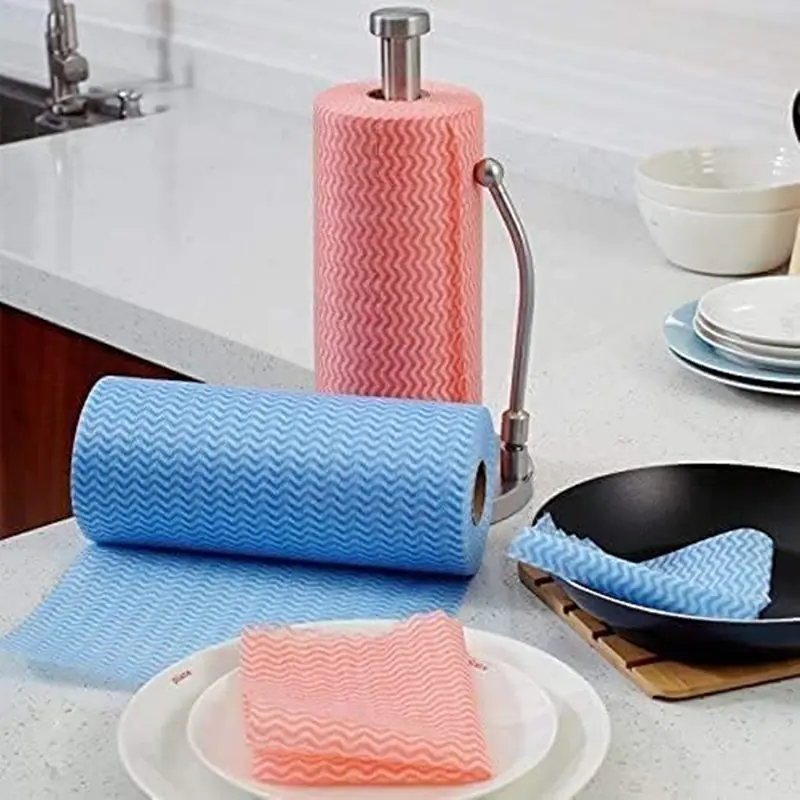
Good Stuff for Food Businesses
For catering businesses and restaurants, disposable kitchen cloth rolls are a big help.
- Ready for Checks: Health inspectors check kitchens (compliance audits). Using fresh cloths helps show good hygienic kitchen practices. This helps with audit readiness for things like NSF International checks or ISO 22000 certification. It helps keep health department ratings high. Good compliance documentation is easier.
- Save Money: Washing old cloths costs money for water, power, soap, and worker time (laundry costs). Disposable kitchen towels offer cost-effective sanitation. You might find savings with bulk purchasing savings.
- Manage Allergies: In busy kitchens, keeping allergy foods away from other foods is vital. Single-use cleaning cloths make allergen management much safer. This stops dangerous cross-contact allergens from spreading. The Allergen Control Group knows this is important.
- Real Results: Imagine a restaurant switching to disposable cloths. They might see fewer health warnings. One place cut problems by 60%! This shows how much hygienic kitchen practices improve. This is important for industrial food prep and high-traffic kitchens. Good sanitation workflow matters in food processing areas. Even things like grease traps maintenance can be done more cleanly. Quick turnover cleaning means tables are ready faster (quick table turnover). Staff training programs can teach the best ways to use them. Using a kitchen audit checklist helps track progress. Total Viable Count (TVC) testing or Microbial swab tests can prove things are cleaner. Following the Safe Quality Food (SQF) Program is easier.
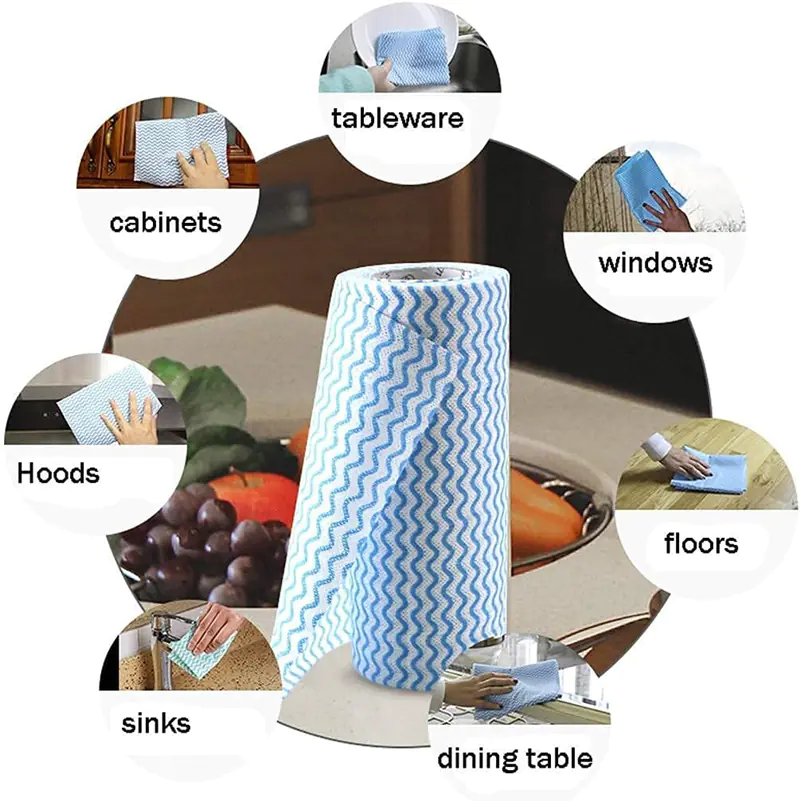
Good Stuff for Your Home Kitchen
These handy rolls are great for daily life too.
- Fewer Germs at Home: Keep your family safer. Use disposable kitchen towels for messy jobs. This means better germ reduction and helps with foodborne illness prevention. Stop worries about bugs like Norovirus or E. coli. Prevent mold/mildew prevention issues from damp cloths.
- Easy Peasy: No more smelly, germy cloths hanging around. Effortless disposal makes cleanup fast. No need for special odor-control wipes when the source of the smell is thrown away!
- Use Them Anywhere: They are great for spill management. Use them for wiping counters, cleaning spills, or shining up stainless steel sanitation jobs. They are safe for multi-surface sanitation. Find absorbent roll towels that handle big messes. Some are moisture-resistant wipes, perfect for damp areas like near the dishwashing station hygiene zone. Check out this great absorbent disposable kitchen towel roll for home use. Proper use improves food handler safety, even for home cooks.
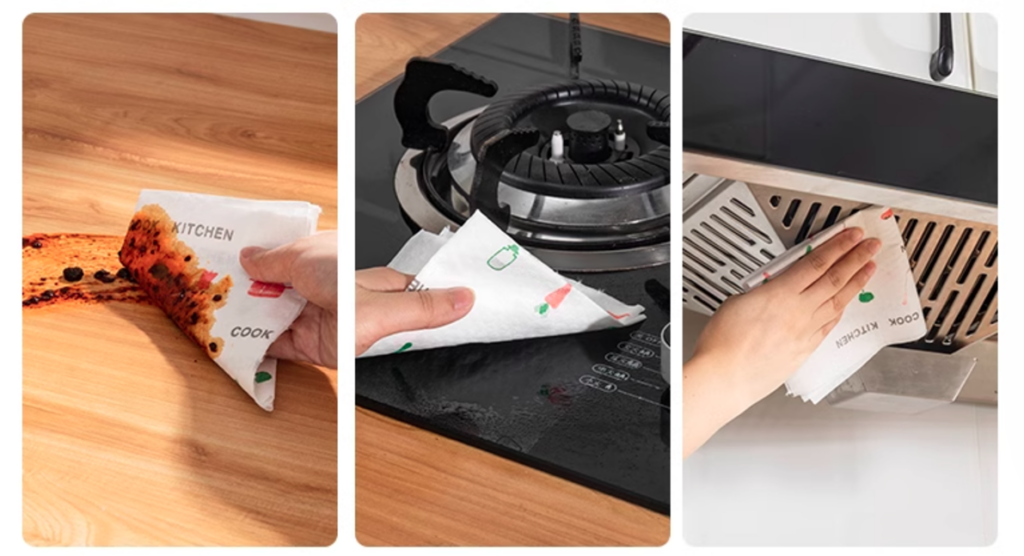
Picking the Best Disposable Cloth Roll
Not all rolls are the same. Here’s what to look for:
- Safety Checks: Look for marks like NSF certification or meeting BRC Global Standards. If you want eco-friendly, look for ASTM D6400 which means it’s good for composting. Third-party lab testing adds trust.
- What They Do: Think about liquid absorption rate – how much liquid can it soak up? How well does it handle grease absorption? Are they oil-resistant materials? Check chemical compatibility – can you use them with your cleaners (disinfectant compatibility)? Are they lint-free wipes or have low-lint performance? You want non-abrasive surfaces for delicate items. Wet-strength integrity means they won’t fall apart when wet. Good abrasion resistance helps with scrubbing. Portion-controlled usage can save money.
- Green Choices: Choose eco-friendly kitchen supplies. Look for biodegradable wipes made from biodegradable cellulose fibers or bamboo. Check if they are PFAS-free materials. Make sure they use non-toxic cleaning materials and food-safe dyes. Good rolls have shelf-life durability and maybe even extended shelf life. Some have thermal stability and good flexural strength.
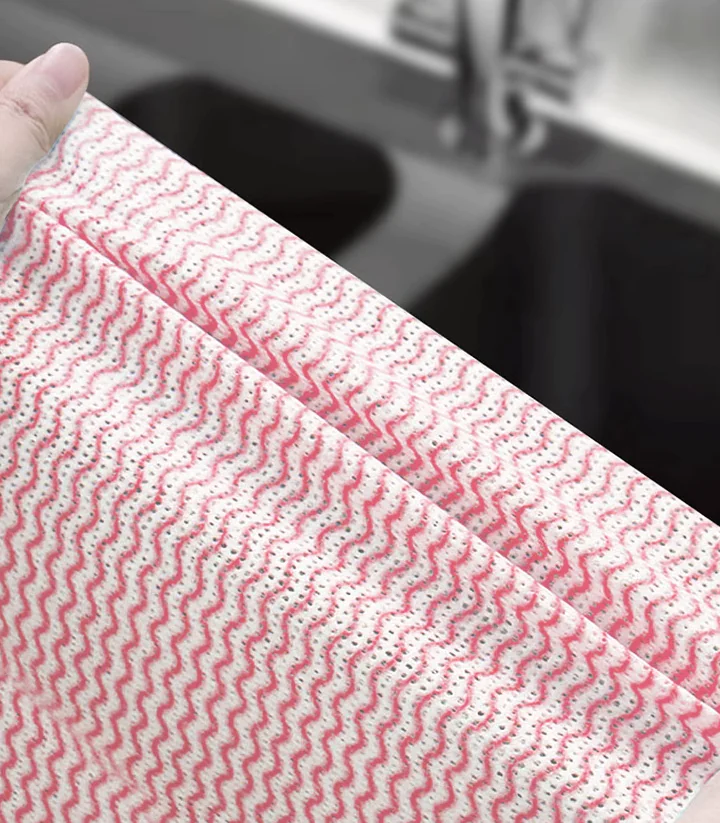
Throw-Away vs. Washable: Side-by-Side
Let’s compare disposable kitchen cloth rolls and reusable ones.
- Cleanliness: Studies show reusable cloths hold lots of germs. Disposable kitchen towels start fresh every time. This means better hygiene and bacteria reduction. They avoid contamination hot spots.
- Cost: Washing cloths uses water, power, and soap (cost analysis). Throw-away rolls seem like you buy more, but you save on washing costs (cost-effective sanitation). Think about water conservation too.
- Planet Earth: This is part of the reusable vs. disposable debate. Reusable microfiber alternatives can shed tiny plastic bits (microfiber shedding) when washed. Biodegradable wipes made from plants can break down (waste reduction strategies). Look for green certifications. Consider the whole environmental impact. Try these Non woven disposable cleaning wipes roll for a strong option. Good ergonomics in cleaning can mean less physical strain too.
Using Disposable Systems the Smart Way
Switching is easy, but doing it right helps most.
- Teach Your Team: Good staff training programs show how to use cloths for specific tasks (kitchen zoning systems) and toss them safely in hygienic disposal bins.
- Keep Them Clean: Use industrial roll dispensers or touchless dispensers to keep rolls clean before use. Good sanitary storage solutions like sterile packaging or UV-resistant packaging help too.
- Throw Away Right: Follow rules for waste management. If you use compostable rolls, find municipal composting facilities. Proper waste segregation is important. Some systems are part of larger Clean-in-Place (CIP) protocols in big kitchens. Pre-moistened wipes are another option to consider for convenience.
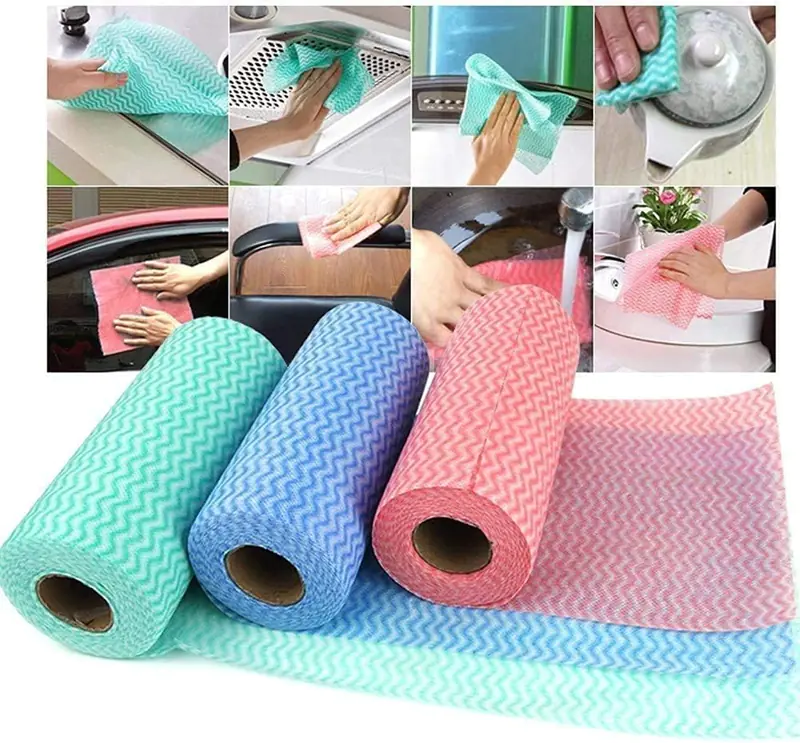
Thinking About Our Planet
People worry about throwing things away (environmental impact). But there are green choices.
- Break Down Naturally: Biodegradable wipes made from plants like biodegradable cellulose fibers or bio-based polymers can return to the earth in aerobic digestion processes or anaerobic digestion plants. Look for compostable packaging standards (ASTM D6400). Some use thermal hydrolysis in processing.
- Recycle: Some makers have recycling initiatives or use closed-loop recycling systems. Look for plastic-free alternatives.
- Use Less Water/Power: Not washing cloths saves water and energy (water conservation). This lowers the carbon footprint metrics. Look for sustainable sourcing symbols like Sustainable Forestry Initiative (SFI) or Green Seal certification / Ecolabel certifications. Aiming for zero-waste kitchens fits with circular economy frameworks. Some materials might even be static-resistant fibers.
Quick Questions Answered (FAQs)
- Q: Can I use any cleaner with these cloths?
- A: Check the package for chemical compatibility. Most work with common kitchen cleaners (disinfectant compatibility), but very strong chemicals might need special temperature-resistant cloths or oil-resistant materials. Look for third-party lab testing info.
- Q: Are they cheap enough for my home?
- A: Buying in bulk purchasing savings can make them cost-effective sanitation tools even at home. Think about the time and washing costs saved.
- Q: Do compostable ones handle grease well?
- A: Yes, many biodegradable wipes have good grease absorption. Look for ones designed for kitchen use.
- Q: Can I put them in a commercial dishwasher?
- A: No, these are single-use cleaning cloths meant for effortless disposal, not washing. They don’t have the needed thermal stability for dishwashers.
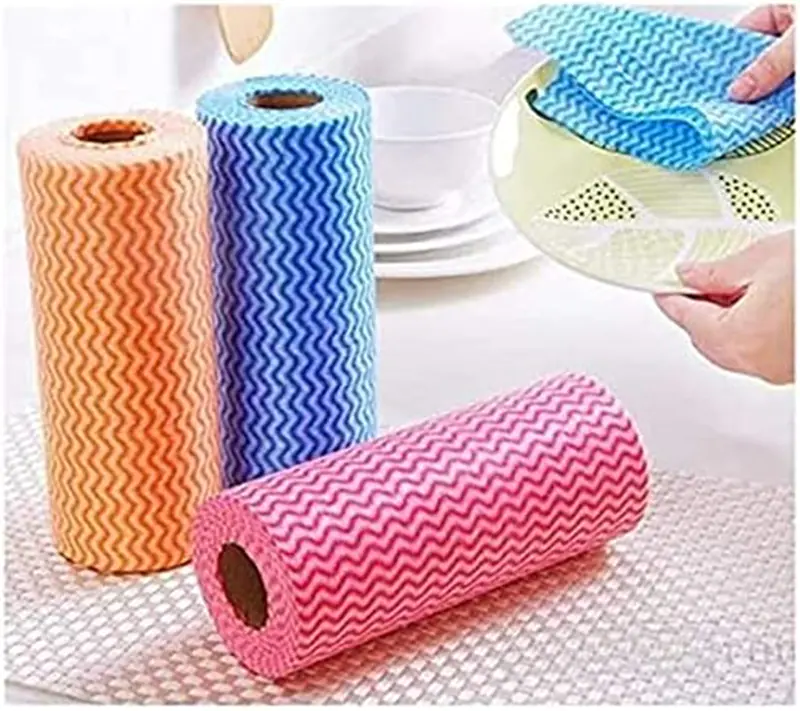
Last Thoughts and What To Do Next
Disposable kitchen cloth rolls are a smart choice for better food safety compliance. They help stop germs (pathogen control, virus suppression), prevent cross-contamination prevention, and make hygienic kitchen practices easier in catering businesses and daily life. They help meet rules from the FDA and follow HACCP guidelines and the Food Safety Modernization Act (FSMA). They even support Occupational Safety and Health Administration (OSHA) goals by providing safer tools for workers. Look for products meeting European Norm (EN) standards. Groups like the National Restaurant Association (NRA) and Hygienic Design Institute support better hygiene. While microfiber alternatives exist, disposable options avoid microfiber shedding. They help manage cross-contact allergens, a concern for the Allergen Control Group. They reduce risks from Staphylococcus aureus, E. coli, and Salmonella prevention. They fit into modern farm-to-table supply chains by ensuring cleanliness at the prep stage. Some advanced options might use PFAS-free materials, food-grade silicone adhesives, or work alongside tech like UV-C disinfection robots or PathoSans electrochemical cleaner. They help control contamination hot spots where bacterial biofilm prevention is tough. They simplify meeting sanitation standards without complex Rapid ATP testing systems or measuring Water Activity (aW) thresholds daily. They help avoid Mycotoxin contamination risks from unclean surfaces. They support goals like LEED certification (green building) through water savings. They are safer than methods needing Microwave-assisted sterilization for cloths. They improve air quality compared to dusty rags, supporting spaces with High-efficiency particulate air (HEPA) filtration. While not made of Antimicrobial copper coatings, they offer surface hygiene. They are simpler than managing Industrial Electrodialysis systems for water purity.
Call to Action: Ready to make your kitchen safer? Try using disposable dish wipes cleaning cloth for kitchen for your cleaning tasks.
Final Tip: Start with one roll. See how easy and clean it feels!



